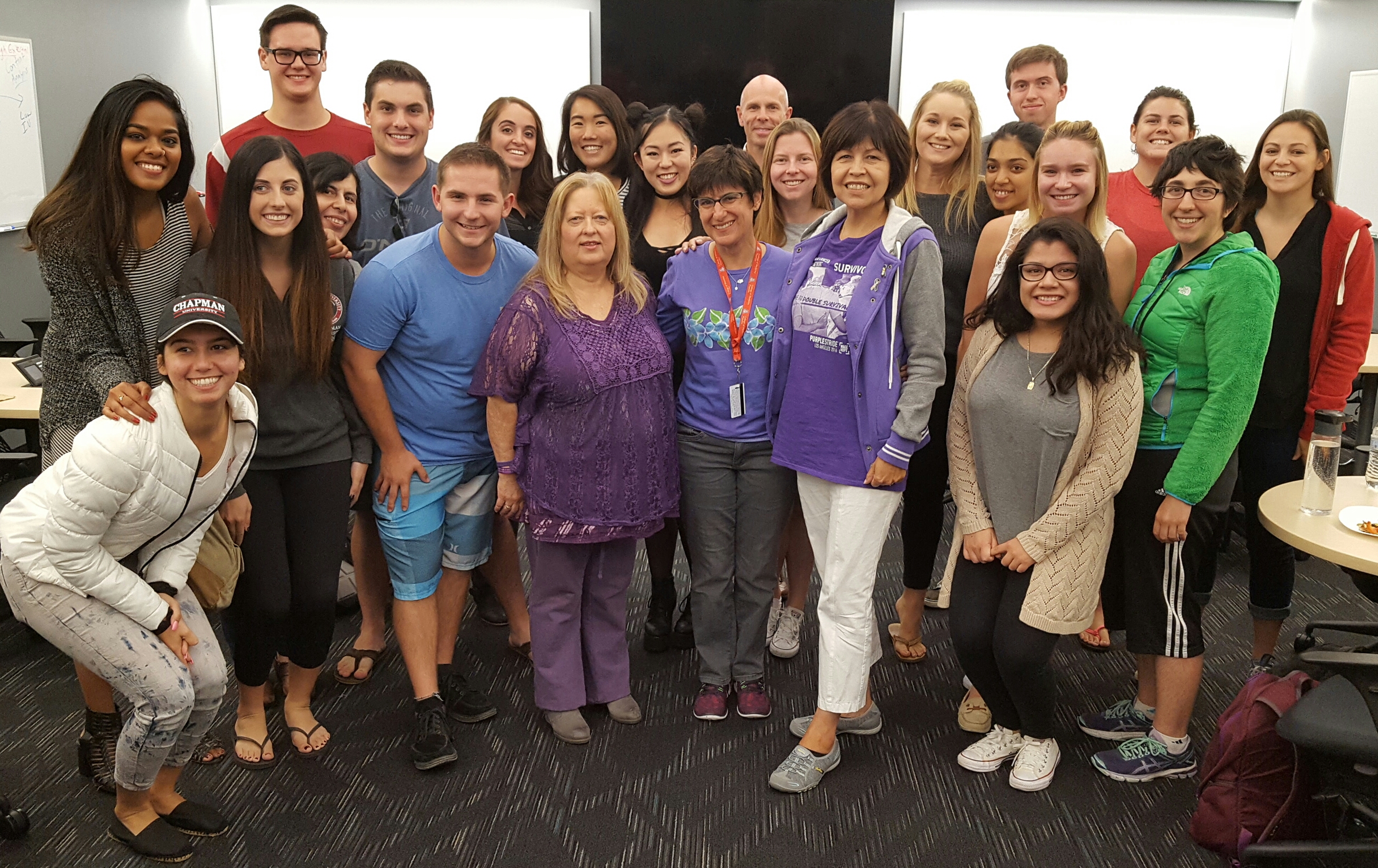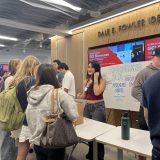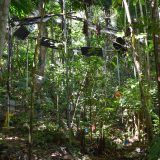Students in Cancer Biology Class Get a Lesson from Pancreatic Cancer Survivors
October 17, 2016
Last Thursday, Chapman University’s Biology of Cancer class hosted Lupe Romero, a nearly 5-year pancreatic cancer survivor, and Roberta Luna, a 14-year pancreatic cancer survivor. The women generously shared their highly personal experiences with pancreatic cancer to the room of approximately 25 upperclass biochemistry and molecular biology majors and biological sciences majors. Most of the students present said they plan to or are in the process of applying to medical school or desire to go into some type of medical research. The goal of all in the room: to help future doctors and medical researchers understand the disease, patient needs and areas of future research.

Pancreatic cancer survivors Roberta Luna (front left in purple) and Lupe Romero (front-right in purple) stand with Prof. Melissa Rowland-Goldsmith (front-center in purple) and the students in the Cancer Biology class she co-teaches with Prof. Marco Bisoffi (back center).
This dialogue was organized by Prof. Melissa Rowland-Goldsmith, who co-teaches the class with Prof. Marco Bisoffi. Dr. Rowland-Goldsmith and Dr. Bisoffi received a co-teaching grant to develop and teach this new course. As Rowland-Goldsmith describes it, “This class is a labor of love.” Both professors are cancer researchers, and both knew early on when developing this class that they wanted to have cancer survivors speak to the students about the human side of this disease.
When Rowland-Goldsmith was a postdoctoral fellow in a pancreatic cancer lab, she described seeing “many researchers not care about who they were trying to help. They only cared about completing their experiments so they could publish their results.” Rowland-Goldsmith and Bisoffi want the students in this class to cultivate compassion for those with a serious illness, as well as a good bedside manner if they become physicians.
Rowland-Goldsmith has known both Romero and Luna for many years through their work together with the Pancreatic Cancer Action Network (PanCAN), and she introduced them as “two of the most inspirational people I’ve ever met.” After all, Romero has run in the Los Angeles marathon 10 times and Luna has skydived multiple times. Both women also survived pancreatic cancer years longer than their doctors expected and they have made it their mission to provide hope to fellow pancreatic cancer patients as well as the doctors who treat them.
Romero and Luna, with warmth and sage perspective, spent an hour and a half speaking to and answering questions from students about all facets of the disease. “You can ask us anything- there’s nothing we won’t talk about,” Luna said while Romero nodded. The conversation explored “chemo brain”, how invasive pancreatic cancer tests are, what symptoms looks like and how vague they can be, the role faith has played for each of women in their cancer journeys, stereotypes associated with pancreatic cancer, and the struggle patients have with getting doctors to see them as a whole person, not just their diagnosis or a bunch of cells growing on a plate. .
The students sat in the class with rapt attention. And they had many questions: What gives you motivation? What do you wish your oncologist had done differently for you? Do you feel like any of the holistic therapies you tried helped you? What are your views on palliative care and the proper way for doctors to present the option to patients? What is the most common misconception about cancer would want to dispel?
To that last question, they both replied, almost in unison, “that it’s not a death sentence.” That is not to trivialize the the seriousness of pancreatic cancer, as it remains the only cancer with single-digit survival rates. Instead, the women want the room of future doctors, oncologists, pediatricians and medical researchers to “have some hope, give [patients] that positivity.” Because as both women pointed out, a patient’s outlook deeply affects his/her health and recovery. When her doctor delivers the diagnosis with hopelessness it deflates a patient’s willingness to fight. That hopelessness might also diminish a doctor’s or researcher’s willingness to keep exploring options- to not give up on pancreatic cancer patients.
Romero, the marathoner, gave the students a window into how a cancer survivor views the cancer journey and how she deals with the pain of treatment. She said she uses her marathon running experience to help her through her chemotherapy treatments. “I take a mile at a time, then toward the end, when everything hurts- even your hair- take it one step at a time.” Her motto could be: keep going.
In their parting words to the class, both Luna and Romero encouraged the students, as they become future doctors and medical researchers, to keep going, keep searching for answers. Luna also added wise advice for all of us: “If there’s something you want to do- go do it! Don’t wait until you are diagnosed to do what you want.”


